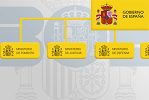Succession or inheritance
Content
Last wills and testaments: registration and certificates
Central Registry of Last Wills and Testaments
The Central Registry of Last Wills and Testaments is a public registry, under the authority of the Ministry of the Presidency, Justice and Relations with the Courts, whose purpose is to provide the information necessary for any persons concerned to find out whether a deceased person has made a will or wills and, if so, the notary or notaries before which a will was made.
This allows heirs to contact the notary who authorised the last will and testament and obtain an (authorised) copy of it.
The Central Registry of Last Wills and Testaments is responsible for:
- Incorporating into the registry database, on a weekly basis, the information sent by notarial associations concerning wills executed before all Spanish notaries: when a will is executed, the notary informs the notarial association to which he or she belongs that a particular person has executed a will and of the date on which it was executed, and the association then sends that information to the Central Registry of Last Wills and Testaments.
- Incorporating information forwarded by the Directorate-General for Spaniards Abroad and Consular Affairs relating to wills executed abroad before Spanish Consuls; registering foreign wills made before foreign notaries by any citizen who expresses the desire to have a will registered in Spain; and the registration of wills authorised in any of the signatory countries of the Convention on the Establishment of a Scheme of Registration of Wills’, concluded at Basel on 16 May 1972
 .
. - Incorporating into the registry database, on a weekly basis, the information sent by notarial associations concerning statutory declarations of intestate heirs made before a notary. When a person dies without making a will, a ‘Declaration of Intestate Heirs’ is drawn up, in which the heirs are determined in accordance with the criteria established by law. This declaration can be drawn up, at the choice of the applicant, before a notary authorised to practise in the place of the last habitual residence or address of the deceased person, or in the place where most of the deceased person’s assets were located, or in the place where the deceased person died, provided these places are in Spain. It is also possible to select a notary from a district adjacent to the places referred to above. In the absence of all of the above, the notary in the place of residence of the applicant will have jurisdiction.
Last will and testament certificate
A last will and testament certificate is required in order to carry out any procedures relating to succession.
Who can request the certificate?
Anyone can apply for the certificate provided that they submit the required documents or, for electronic requests, where the necessary information relating to the death is available electronically.
Important additional information
If the last will and testament certificate is to have validity abroad, it must be authenticated. Do not forget to mention this when requesting the certificate at the place where it is issued. Universal legalisation or Hague Apostille![]()
Life insurance policies: registration and certificates
Registry of Life Insurance Policies
The Registry of Life Insurance Policies is a public registry, under the authority of the Ministry of the Presidency, Justice and Relations with the Courts, whose purpose is to provide the information necessary for any persons concerned to find out whether a deceased person took out life insurance and [if so] the insurance company with which it was taken out. This allows potential beneficiaries to contact that company to determine whether they are beneficiaries and, where appropriate, claim the benefits under the policy from the insurance company.
Life insurance policy certificate
A life insurance policy certificate attests to the existence of valid policies under which the deceased person was insured and provides the name of the insurer. In the event that the deceased person is not listed under any insurance policy, this fact will be expressly stated in the certificate issued.
The insurance policies for which a certificate can be obtained are those relating to life insurance policies with death cover and accident insurance policies which cover the insured person’s death, whether they are individual or group policies.
Certificates are not issued for the following:
- Insurance policies which implement company pension commitments for employees and beneficiaries governed by Royal Decree 1588/1999 of 19 October
 .
. - Insurance policies in which, in the event of the insured person’s death, the policyholder and the beneficiary are one and the same person.
- Contracts underwritten by mutual insurance companies which act as instruments of corporate social welfare, professional association mutual insurers and mutual insurers having the sole purpose of granting loans or subsidies for teaching or education.
The data is available in the Registry of Life Insurance Policies for 5 years after the date of death.
Who can request the certificate?
Anyone can apply for the certificate provided that they submit the required documents or, for electronic requests, where the necessary information relating to the death is available electronically.
Important additional information
If the life insurance policy certificate is to have validity abroad, it must be authenticated. Do not forget to mention this when requesting the certificate at the place where it is issued. Universal legalisation or Hague Apostille![]()
Information note on life insurance policies
What is it?
The information note on life insurance policies is the document sent to any persons who, DURING THEIR LIFETIME, wish to know whether life assurance policies, in force and linked to their identification document, have been recorded in the Life Insurance Policies Register. This is done by exercising the right of access to personal data.
This right may be exercised at any time, free of charge, upon providing proof of the applicant’s identity.
If information in the Register is inaccurate, incorrect or inadequate, the insured person will be given the name of the relevant insurance company in order to ask it to correct the information, as the company is in charge of processing the data.
Who can apply for an information note?
Any person may apply who wishes to know whether life insurance policies, in force and linked to their identification document, are properly recorded in the Life Insurance Policies Register.
Proof of the applicant’s identity is required by presenting a NIF (tax ID No.), passport, or residence card. If an application is made through a representative, a specific notarised power of attorney is required. For applications made by post, a notarised application letter duly signed by the applicant / insured person is required.
How to submit applications for certificates and information notes
The application can be submitted in three ways:
- in person
- by post
- online
-
In person
Where to submit an application:
- In the Autonomous Community of Madrid: at the Central Citizens’ Assistance Bureau
 (Oficina Central de Atención al Ciudadano). It is essential to request an appointment
(Oficina Central de Atención al Ciudadano). It is essential to request an appointment .
. - In the other Autonomous Communities: at the regional offices
 (Gerencias Territoriales) of the Ministry of the Presidency, Justice and Relations with the Courts. It is essential to request an appointment
(Gerencias Territoriales) of the Ministry of the Presidency, Justice and Relations with the Courts. It is essential to request an appointment .
.
How to collect the certificate
Via the same channel through which it was requested, unless other means of collection/receipt are expressly stated.
How long does it take to be issued?
When an application is made in person, the certificate or information note is usually issued on the spot.
However, in certain cases a longer period may be required: up to 10 working days from the date of application.
Important additional information
Due to an increase in demand for the service, there may be occasional delays in issuing certificates.
- In the Autonomous Community of Madrid: at the Central Citizens’ Assistance Bureau
-
By post
Where to submit an application
Your application can be sent by post to the following address:
Central Registry of Last Wills and Testaments
Ministerio de Justicia
Plaza Jacinto Benavente, 3
28012 – MadridHow to collect the certificate
Certificates requested by post will be sent by the Central Registry of Last Wills and Testaments to the address indicated by the applicant in the ‘Identification’ section of Form 790
 .
.The Registry of Life Insurance Policies will send information notes applied for by post to the postal address indicated in the applicant’s letter.
How long does it take to be issued?
- Last will and testament certificate: this is issued within 10 working days from the day after the application is received.
- Life insurance policy certificate: this is issued within 7 working days from the day after the application is received.
- Information notes are issued within a maximum of 1 month from the day after they are received.
Important additional information
Due to an increase in demand for the service, there may be occasional delays in issuing certificates.
Certificates applied for by post from abroad
Applications for certificates should be addressed to the Central Registry of Last Wills and Testaments of the Ministry of the Presidency, Justice and Relations with the Courts along with the following documentation:
- Original death certificate, issued by the Civil Registry or the corresponding entity of each country, duly authenticated and translated.
- The document providing proof of payment of the fee.
-
Online
Where to apply for it
- Last will and testament certificate

- Life insurance policy certificate

- Information note on life insurance policies
How long does it take to be issued?
- Last will and testament certificate: this is issued within 10 working days from the day after the application is received.
- Life insurance policy certificate: this is issued within 7 working days from the day after the application is received.
- Information notes on life insurance policies are issued within 7 working days from the day after they are received.
Important additional information
Due to an increase in demand for the service, there may be occasional delays in issuing certificates.
- Last will and testament certificate
Documentation and necessary requirements (in person and by post)
This information applies only if you are going to make your application in person or by post, but not if you opt for the online procedure.
-
Application for certificates and information notes
Applications for Last Will and Testament Certificates must be made by Form 790, which can be downloaded from this page
 or obtained free of charge from the following locations:
or obtained free of charge from the following locations:- The Central Citizens’ Assistance Bureau
 (Oficina Central de Atención al Ciudadano) of the Ministry of the Presidency, Justice and Relations with the Courts in Madrid. It is essential to have a prior appointment
(Oficina Central de Atención al Ciudadano) of the Ministry of the Presidency, Justice and Relations with the Courts in Madrid. It is essential to have a prior appointment and to have obtained the documents referred to in the confirmation for the appointment.
and to have obtained the documents referred to in the confirmation for the appointment. - The regional offices
 (Gerencias Territoriales) of the Ministry of the Presidency, Justice and Relations with the Courts. It is essential to have a prior appointment
(Gerencias Territoriales) of the Ministry of the Presidency, Justice and Relations with the Courts. It is essential to have a prior appointment and to have obtained the documents referred to in the confirmation for the appointment.
and to have obtained the documents referred to in the confirmation for the appointment.
The application cannot be submitted until 15 working days after the date of the death, not counting the actual day of the death, Saturdays, Sundays or holidays.
An application for life insurance information searches must be made by means of an application letter signed by the applicant/insured person and legalised before a notary.
- The Central Citizens’ Assistance Bureau
-
Documentation to be provided
In order to apply for Last Will and Testament Certificates, you must provide:
The death certificate, which must be the original or a certified photocopy, issued by the Civil Registry in the region where the person died, and which must state the names of the parents of the deceased person.
Important: It is not necessary to submit a death certificate if the date of death is after 2 April 2009 and the death is not registered before a Justice of the Peace, as it can be consulted online. In this case, you must present the DNI/NIE/passport or other ID document of the deceased person.
In this case, it is necessary to provide the deceased person’s national identification number (NIE) or foreign national’s identification number (NIE) (if there is no NIE, the passport number or, where none is available, the number of another identification document from the person’s country of origin should be provided).
There is no need to provide any additional documentation when applying for life insurance information searches.
-
Payment of the fee
A fee must be paid when applying for Last Will and Testament certificates. This can be done by using any of the following options:
Payment via online banking
If you have an account open with any of the financial institutions working with the Spanish tax authorities, you can make the payment through their online banking services.
To do so, you must first download Form 790 and fill in your receipt number (número de justificante) in the ‘Administrative Fees 790’ section of your online banking system and, if the option exists, ‘Code 006 Administrative Fees, Ministry of Justice’.
For the certificate to be issued, you need to submit proof of payment, which must include the full reference number (NRC) provided by the online banking system, together with the ‘Copy for the Administration’ sheet from Form 790.
Other forms of payment
- In Spain:
You can take the completed Form 790 to a financial institution working with the Spanish tax authorities (nearly all of them do so) to make the payment. Payment will be accredited through automatic validation or an authorised signature from the financial institution on the ‘Copy for the Administration’ sheet of Form 790, which must be presented at the counter or sent by post for the certificate to be issued.
- From abroad there are two options:
- You can take a signed Form 790 to a Spanish bank working with the tax authorities which has a branch in the country in which the application for the certificate is being made. Payment will be accredited through automatic validation or an authorised signature from the financial institution on the ‘Copy for the Administration’ sheet of Form 790 that is sent.
- You may also pay the fee via bank transfer, as long as the transfer is made from an account open in a bank located outside the national territory. To make the transfer, use the IBAN or International Code for the Ministry of Justice’s restricted deposit account, the details of which are provided below, sending the original copy of the proof of payment, along with the ‘Copy for the Administration’ sheet of Form 790.
- INSTITUTION: BBVA
- ACCOUNT HOLDER: Ministry of Justice - restricted account for the collection of fees from abroad
- TAX IDENTIFICATION NUMBER OF THE ACCOUNT HOLDER: S-2813610-I
- IBAN or International Bank Account Number: IBAN ES62 0182 2370 4202 0800 0060
- BBVA Bank Identification Code (BIC): BBVAESMMXXX
Fee payable
EUR 3.86 per certificate. (The amount is revised annually)
Important additional information
Special care should be taken to ensure that the correct fee is paid, as the bank is not able to refund amounts which have been paid incorrectly; if a request for reimbursement is made, the person concerned must make a claim for the refund of sums unduly paid
 .
.When applying for life insurance information searches it is not necessary to pay any fee as these are issued free of charge.
There are no fees for applying for information notes as they are issued free of charge.
- In Spain:
Information for each Autonomous Community




















Legal and/or technical references
-
Decision of 13 January 2011 of the General-Directorate for Registries and Notaries, laying down the requirements and conditions for the electronic processing of applications for last will and testament certificates and life insurance policy certificates, and amending Form 790 relating to payments, applications and instructions, for applications made in person and by post for last will and testament certificates and life insurance policy certificates.

-
Royal Decree 398/2007 of 23 March implementing Law 20/2005 of 14 November establishing the Registry of Life Insurance Policies.

-
Law 20/2005 of 14 November establishing the Registry of Life Insurance Policies

-
Notarial Regulation of 2 June 1944, Annex II (B.O.E 7 July 1944)

-
Ministry of the Presidency, Justice and Relations with the Courts - procedures











